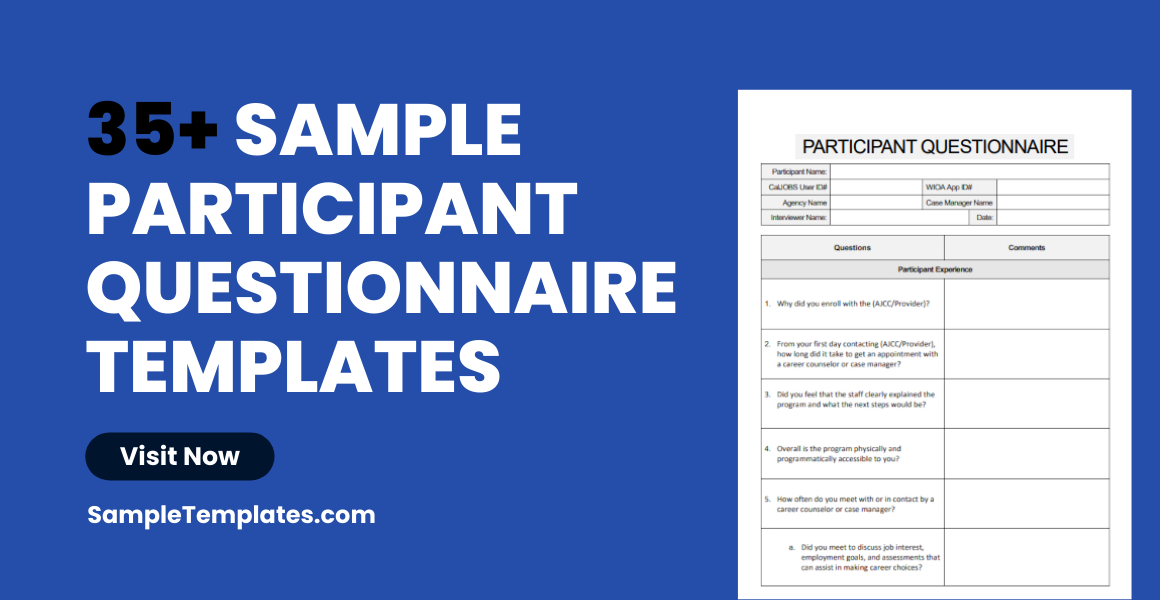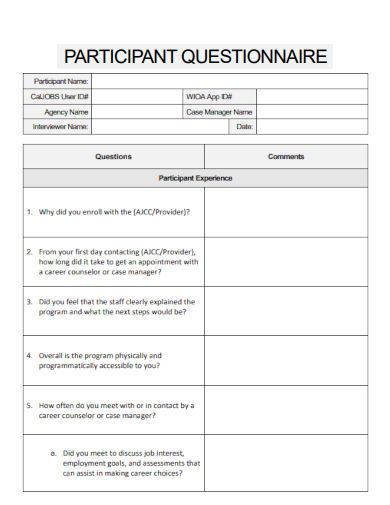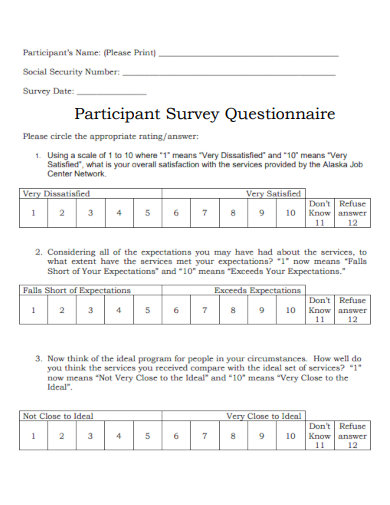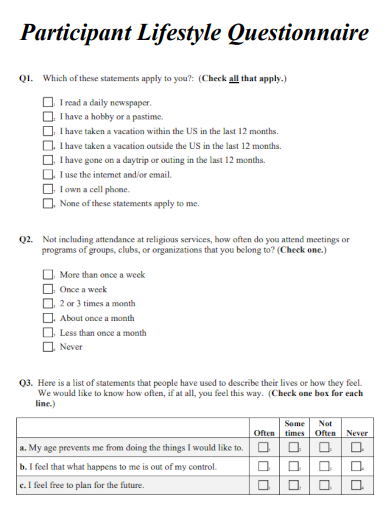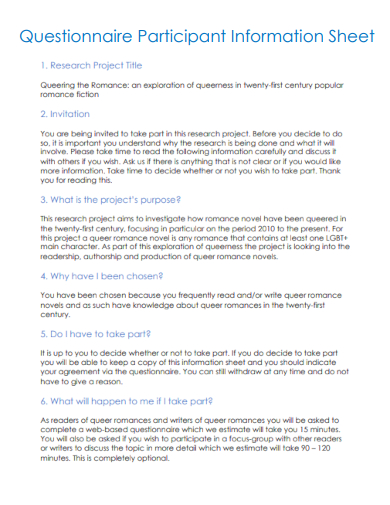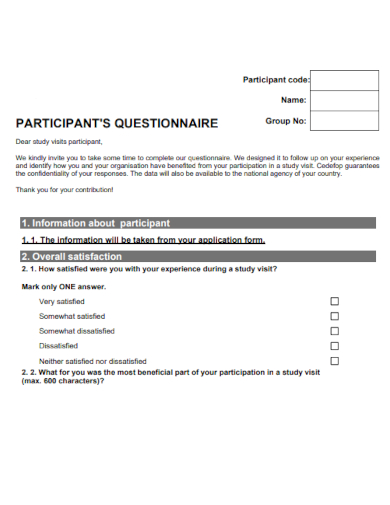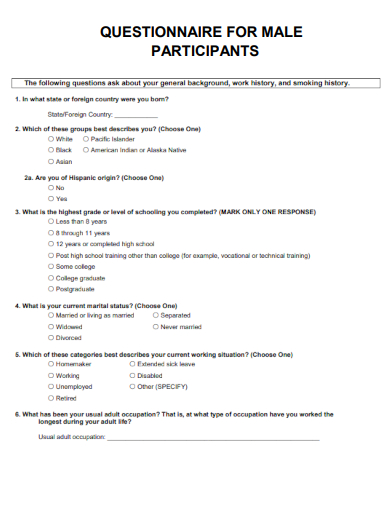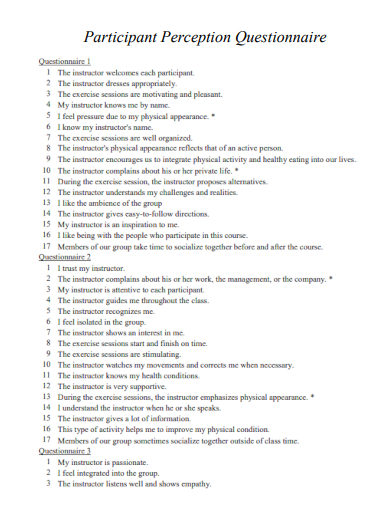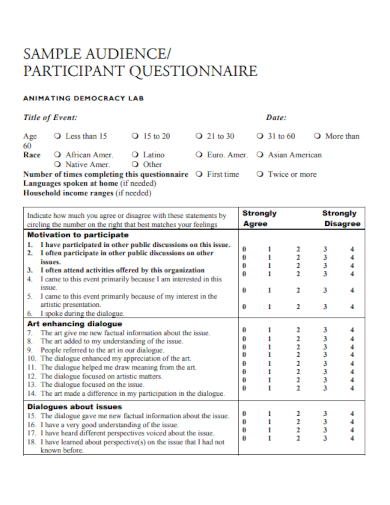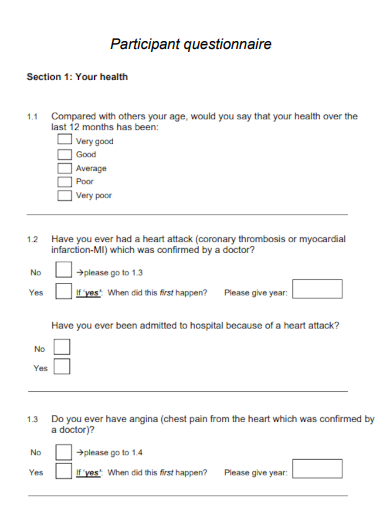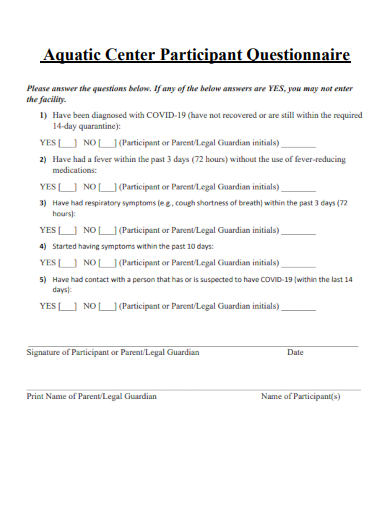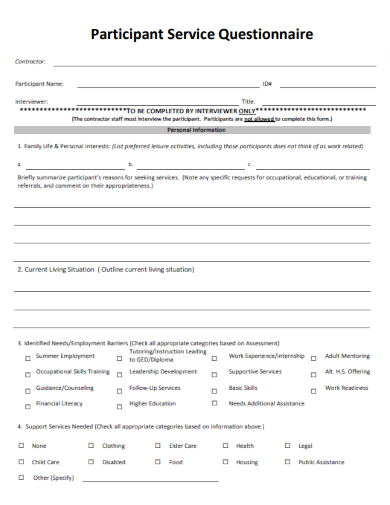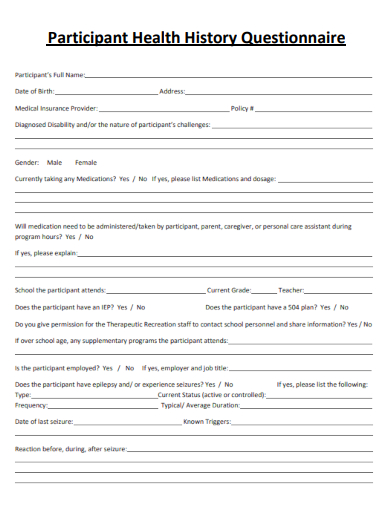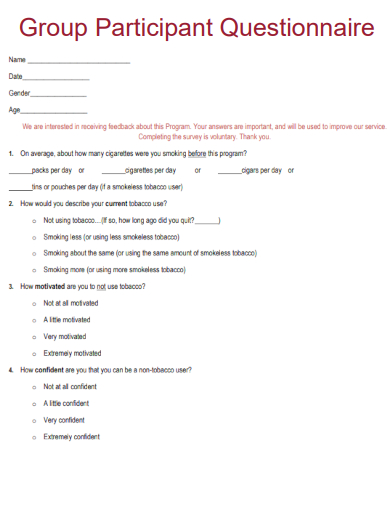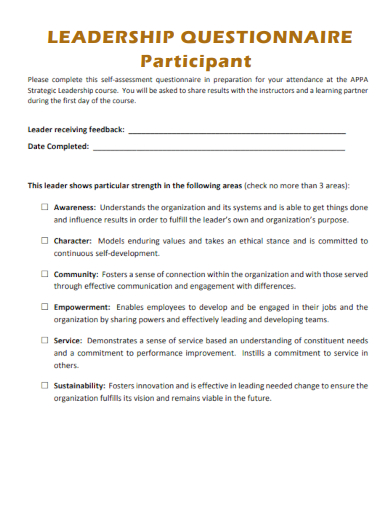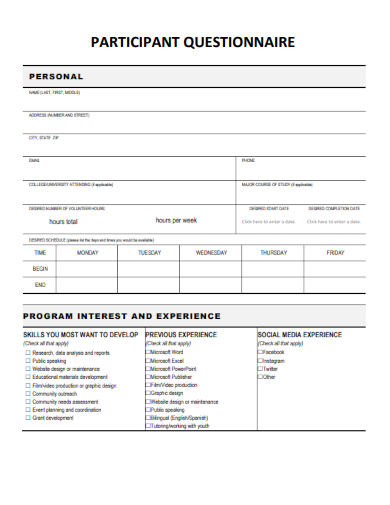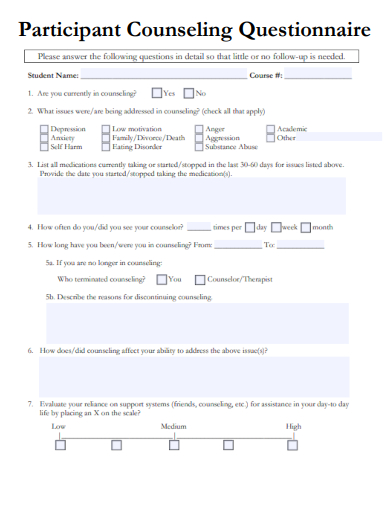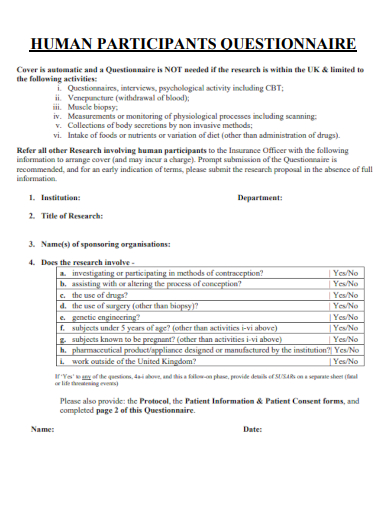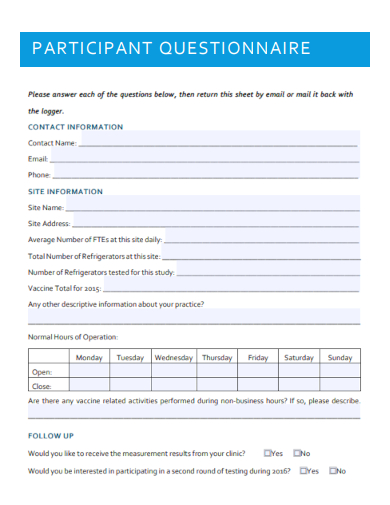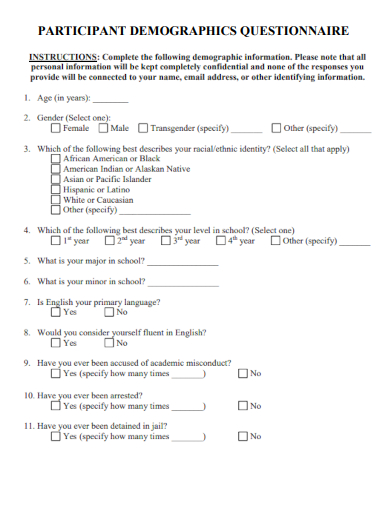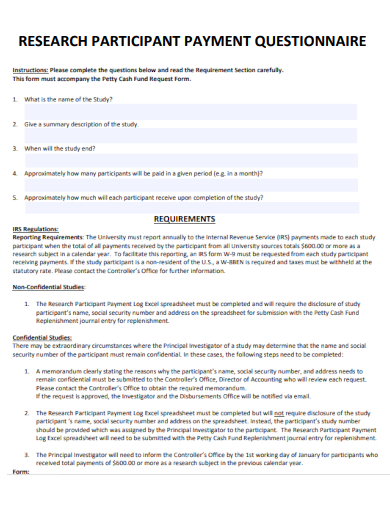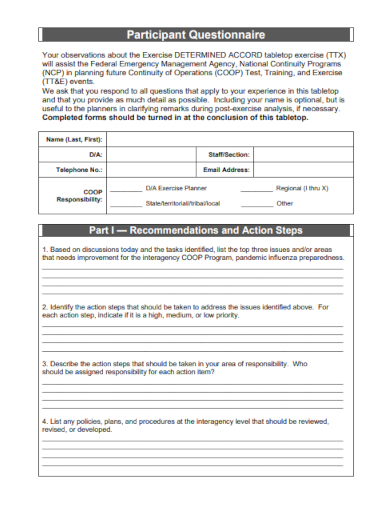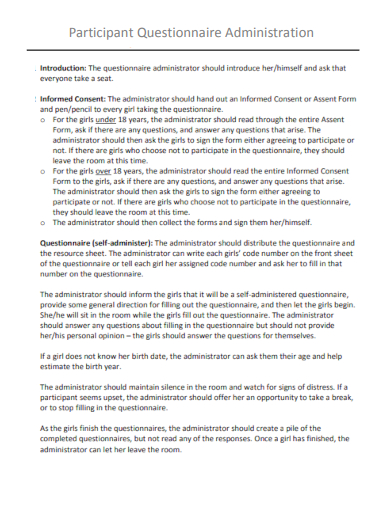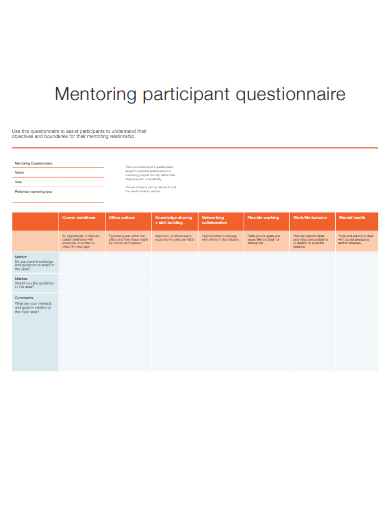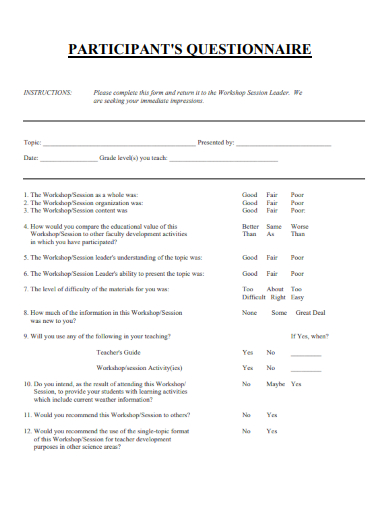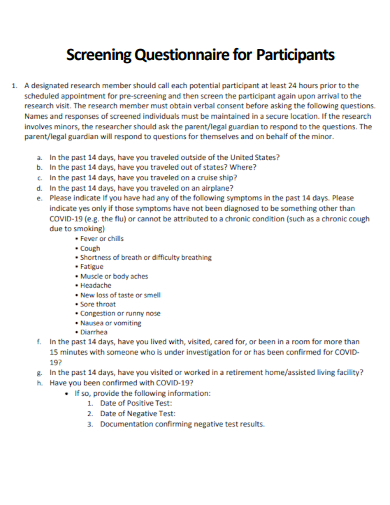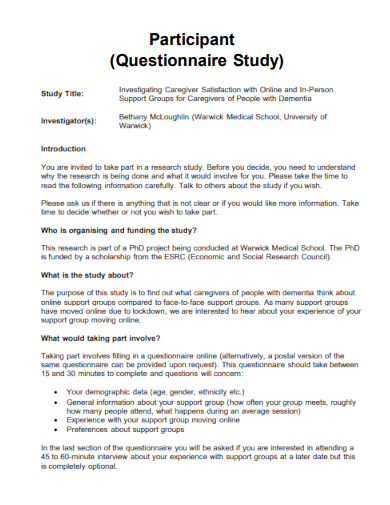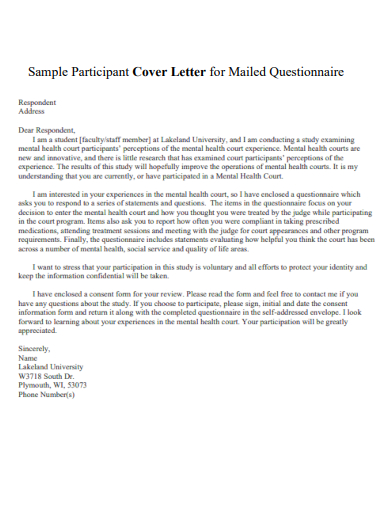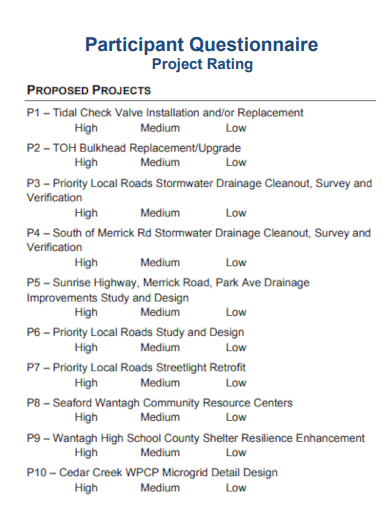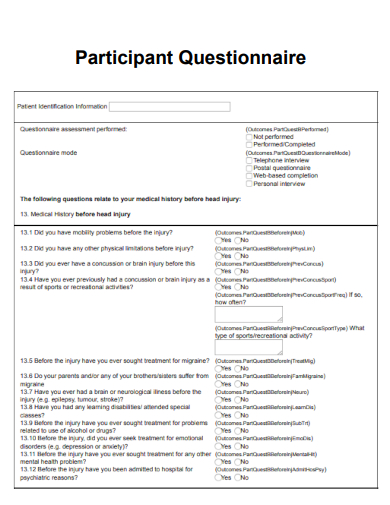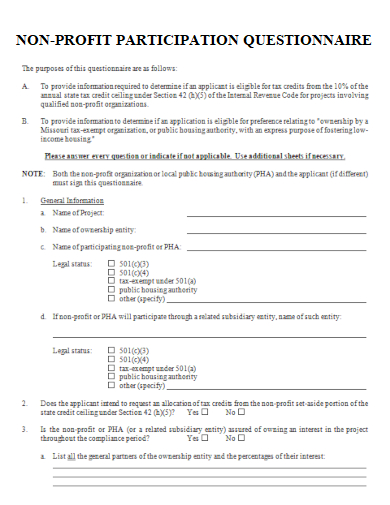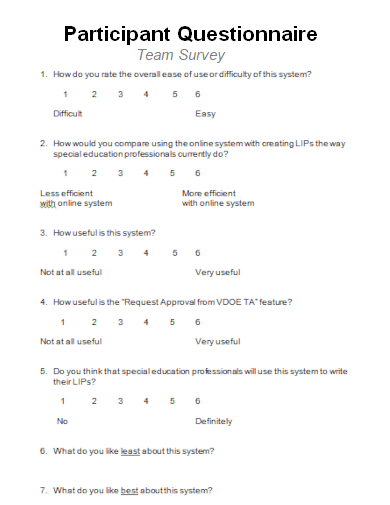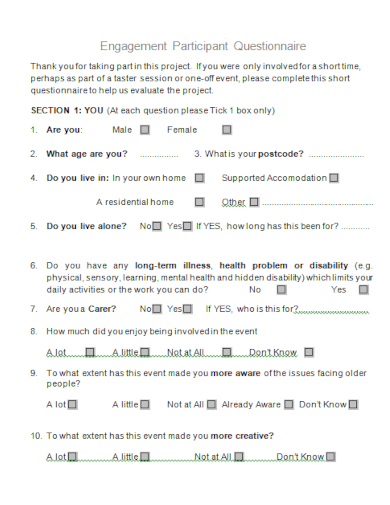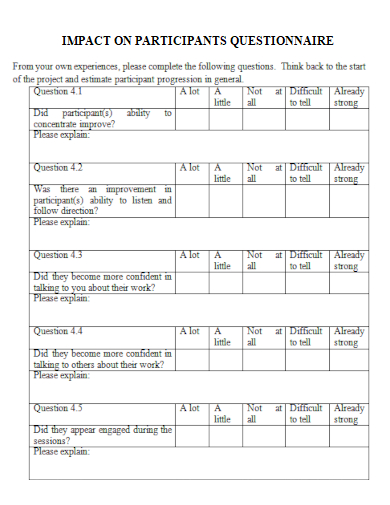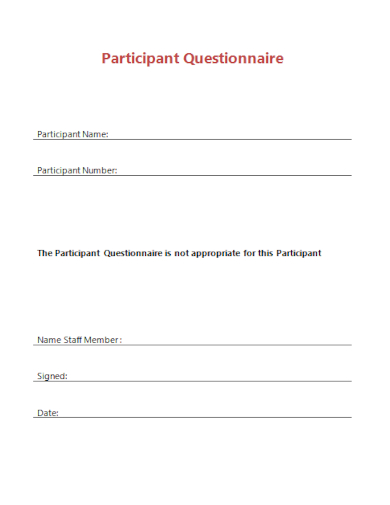Discover the ultimate Sample Participant Questionnaire Template designed to gather meaningful insights from your target audience. Expertly crafted, our template ensures you capture vital feedback, understand preferences, and derive actionable data. Whether you’re launching a new product or refining services, unlock the power of informed decisions with our comprehensive questionnaire. Dive in and harness the potential of genuine participant responses today. Your search for the best survey tool starts and ends here!
FREE 35+ Participant Questionnaire Samples
1. Sample Participant Questionnaire Template
2. Sample Participant Survey Questionnaire Template
3. Sample Participant Lifestyle Questionnaire Template
4. Sample Questionnaire Participant Information Sheet Template
5. Sample Participant Questionnaire Basic Template
6. Sample Questionnaire For Male Participants Template
7. Sample Participant Perception Questionnaire Template
8. Sample Audience & Participant Questionnaire Template
9. Sample Questionnaire for Scoping Study Participants Template
10. Sample Participant Questionnaire Formal Template
11. Sample Aquatic Center Participant Questionnaire Template
12. Sample Participant Service Questionnaire Template
What is a Participant Questionnaire?
A participant questionnaire is a structured tool designed to collect specific information from individuals involved in a study, event, program, or any other activity. These questionnaires are integral to research studies, educational programs, and various industry projects where understanding the demographics, experiences, opinions, or behaviors of participants is crucial.
Purpose of a Participant Questionnaire
The primary purpose of a participant questionnaire is to collect uniform data from all respondents, ensuring consistency and comparability of the information. These questionnaires are tailored to gather insights into the respondents’ thoughts, feelings, habits, and experiences about a specific topic. Whether it’s for a clinical trial, a focus group in market research, or an after-event feedback survey, the objective remains: to extract valuable information directly from those involved.
Components of a Participant Questionnaire
Demographic Information: This section often includes questions about age, gender, educational background, occupation, ethnicity, and other personal attributes. It helps researchers categorize responses and identify trends among specific groups.
Behavioral Data: Questions here probe into the habits and actions of participants, like their consumption patterns, exercise habits, or any other behavior relevant to the study.
Opinions and Attitudes: These questions gauge participants’ beliefs, preferences, and perceptions about a particular topic or set of topics.
Open-ended Questions: While most questions in a questionnaire tend to be closed-ended for ease of analysis, open-ended questions allow participants to provide more detailed and qualitative responses.
Benefits of Using a Participant Questionnaire
Standardization: Every participant answers the same set of questions, ensuring that data is consistent and comparable across respondents.
Anonymity: In many cases, questionnaires can be administered anonymously, encouraging participants to provide honest and unfiltered responses.
Cost-Effective: Once designed, questionnaires can be distributed to a large number of participants with minimal additional costs.
Quantifiable Data: The structured nature of questionnaires allows for easier data analysis, especially with closed-ended questions.
Considerations When Designing a Participant Questionnaire
Clarity: Questions should be clear and concise to avoid misinterpretation.
Relevance: Every question should have a distinct purpose. Avoid including questions that don’t serve the research objectives.
Bias Avoidance: Ensure questions are neutral and don’t lead participants toward a specific answer.
Accessibility: Consider the medium (online, paper-based, etc.) and ensure it’s accessible to all targeted participants.
Pilot Testing: Before the full-scale distribution, test the questionnaire with a smaller group to identify potential issues or areas of confusion.
The Evolution of Participant Questionnaires
With advancements in technology, participant questionnaires have evolved from traditional paper-based surveys to dynamic online tools. Platforms like SurveyMonkey, Google Forms, and Typeform have revolutionized the way these surveys are administered, allowing for real-time data collection, instant analysis, and easy distribution.
Moreover, with the increasing use of mobile devices, many questionnaires are now optimized for smartphones and tablets, ensuring higher participation rates and convenience for respondents.
Participant questionnaires are a cornerstone in the world of research, providing a straightforward yet potent means of gathering valuable data. When crafted carefully and administered correctly, they can offer profound insights, driving more informed decisions across various sectors and disciplines.
13. Sample Participant Health History Questionnaire Template
14. Sample Group Participant Questionnaire Template
15. Sample Leadership Questionnaire Participant Template
16. Sample Personal Participant Questionnaire Template
17. Sample Participant Counseling Questionnaire Template
18. Sample Human Participant Questionnaire Template
19. Sample Participant Questionnaire Blank Template
20. Sample Participant Demographics Questionnaire Template
21. Sample Research Participant Payment Questionnaire Template
22. Sample Participant Questionnaire Printable Template
23. Sample Participant Questionnaire Administration Template
24. Sample Mentoring participant questionnaire Template
Do You Need a Participant Information Sheet for a Questionnaire?
A participant information sheet (PIS) is a vital document provided to potential participants before they partake in a research study. It explains the study’s purpose, procedures, potential risks, and benefits, ensuring that participants have all the information they need to make an informed decision about their involvement. But when it comes to questionnaires, is a PIS always necessary? Let’s delve deeper into the role and significance of the participant information sheet in the context of questionnaires.
Understanding the Role of a Participant Information Sheet
At its core, a PIS is about respecting the rights, dignity, and autonomy of participants. It upholds the ethical principle of informed consent, meaning participants should understand what they’re agreeing to when taking part in research. When participants are fully informed, it not only protects them but also lends greater legitimacy and ethical weight to the research.
When is a Participant Information Sheet Essential for a Questionnaire?
Sensitive Topics: If the questionnaire addresses personal or sensitive topics, a PIS can clarify why these questions are being asked and how the answers will be used.
Long-term Commitment: Some research projects, even those using questionnaires, may require participants to be involved over extended periods. In these cases, a PIS can explain the duration and nature of the commitment.
Potential Risks: If there’s any potential harm or discomfort, even if it’s merely emotional or psychological due to the content of the questions, participants should be informed via a PIS.
Personal Data Collection: In research where personal or identifiable data is being collected, participants need to know how their data will be stored, used, and protected.
When Might a Participant Information Sheet Be Less Crucial?
Low-risk Surveys: For simple, low-risk questionnaires, like feedback forms about a workshop, a detailed PIS may not be as critical. However, a brief statement explaining the survey’s purpose and ensuring data confidentiality might suffice.
Public Polls: Public opinion polls or generic surveys that don’t delve into personal or sensitive areas may not necessitate a full PIS.
Key Components of a Participant Information Sheet for a Questionnaire
Study Overview: A brief description of the research, its objectives, and why it’s being conducted.
Participant Role: A clear outline of what participants will be required to do and the estimated time commitment.
Potential Risks and Benefits: An honest assessment of any possible discomforts, risks, or benefits of participating.
Confidentiality Assurance: Information on how participants’ data will be stored, protected, and used.
Contact Information: Details of the research team or institution for participants to ask questions or raise concerns.
Voluntary Participation: A statement ensuring participants understand that their involvement is entirely voluntary and that they can withdraw at any time without consequences.
While not every questionnaire will require a detailed participant information sheet, researchers must always prioritize the rights and well-being of participants. The decision to provide a PIS should be based on the nature and context of the research, potential risks to participants, and ethical considerations. Even in scenarios where a PIS might seem unnecessary, transparency and open communication with participants remain paramount.
25. Sample Participant Questionnaire Standard Template
26. Sample Screening Questionnaire for Participant Template
27. Sample Participant Questionnaire Study Template
28. Sample Participant Cover Letter for Questionnaire Template
29. Sample Project Rating Participant Questionnaire Template
30. Sample Participant Questionnaire Editable Template
31. Sample Non-Profit Participant Questionnaire Template
32. Sample Participant Questionnaire Team Survey Template
33. Sample Research Participant Questionnaire Template
34. Sample Engagement Participant Questionnaire Template
35. Sample Impact on Participant Questionnaire Template
36. Sample Participant Questionnaire Professional Template
What Information Should Be Optional in a Questionnaire?
When designing a questionnaire, it’s crucial to strike a balance between gathering comprehensive data and respecting participants’ privacy and comfort levels. Some questions can be considered essential to the core of your study, while others, particularly those of a personal or potentially sensitive nature, might be better labeled as optional. Making certain questions optional can encourage participation and ensure ethical standards. Below, we explore which types of information should typically be optional in a questionnaire.
Personal Identifiers
Contact Information: Asking for details such as phone numbers, email addresses, or residential addresses can be off-putting for some respondents, especially if they don’t understand the necessity. When not crucial, it’s advisable to make these fields optional.
Full Names: Some participants might be comfortable sharing their first name or initials but hesitant to provide their full name due to privacy concerns.
Sensitive Personal Information
Income and Financial Information: Unless it’s a study specifically about financial behaviors or demographics, questions about exact income, savings, or financial obligations should generally be optional.
Health Details: Information about a person’s health status, medical history, or mental health can be deeply personal. If it’s not critical to the study’s primary objective, it’s best to leave this as optional.
Religious and Political Affiliations: Given the sensitive and private nature of one’s religious beliefs or political inclinations, such questions should not be mandatory.
Demographic Information That Could Lead to Discrimination
Gender and Sexual Orientation: While it can be relevant in some studies, it’s essential to approach this topic with care. Always provide diverse options and an ‘Other’ or ‘Prefer not to say’ choice.
Ethnic or Racial Background: This can be a sensitive topic, and while it’s often important in demographic studies, ensuring it’s optional can make participants feel more at ease.
Potentially Traumatic or Triggering Topics
Personal Experiences: Questions that probe into areas such as past traumas, abuse, or deeply negative experiences should be optional to avoid causing distress.
Family History: Topics like family medical histories, familial relationships, or family structures can be deeply personal and might not be information everyone is comfortable sharing.
Opinions and Beliefs
Personal Beliefs and Values: If a questionnaire delves into personal, moral, or ethical beliefs, participants should have the choice to abstain.
Employment Details
Workplace Name and Job Position: Some might be comfortable sharing their profession but not specifics like their employer’s name or exact job title due to confidentiality or privacy concerns.
Making certain questions optional not only respects participants’ privacy and autonomy but can also increase the response rate. Participants are more likely to complete a survey if they don’t feel compelled to answer questions that make them uncomfortable. It’s essential, however, to provide clear instructions at the beginning of the questionnaire, emphasizing that while all answers are valuable, participants should only provide information they’re comfortable sharing. This balance ensures data integrity while upholding ethical standards.
Related Posts
Sample Business Card Templates
Sample Cashier Job Descriptions
Questionnaire Samples
FREE 10+ Sample HR Resource Templates in PDF
FREE 10+ HR Consulting Business Plan Samples in MS Word | Google Docs | Pages | PDF
FREE 49+ Sample Job Descriptions in PDF | MS Word
FREE 16+ Nonprofit Budget Samples in PDF | MS Word | Excel | Google Docs | Google Sheets | Numbers | Pages
FREE 13+ Academic Calendar Templates in Google Docs | MS Word | Pages | PDF
FREE 10+ How to Create an Executive Summary Samples in Google Docs | MS Word | Pages | PDF
FREE 23+ Sample Event Calendar Templates in PDF | MS Word | Google Docs | Apple Pages
Company Profile Samples
FREE 10+ Leadership Report Samples [ Development, Training, Camp ]
FREE 24+ Sample Payment Schedules in PDF | MS Word
FREE 10+ Return to Work Action Plan Samples in PDF | DOC
Autobiography Samples & Templates
